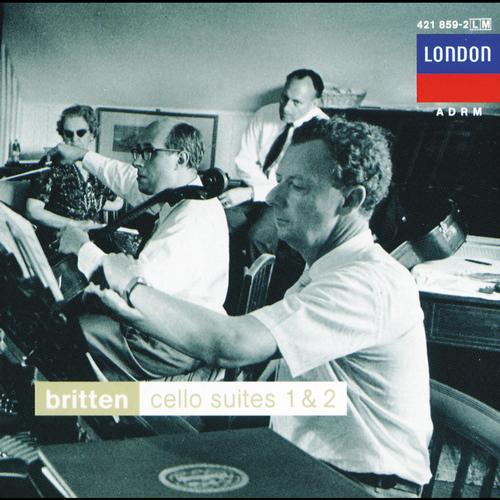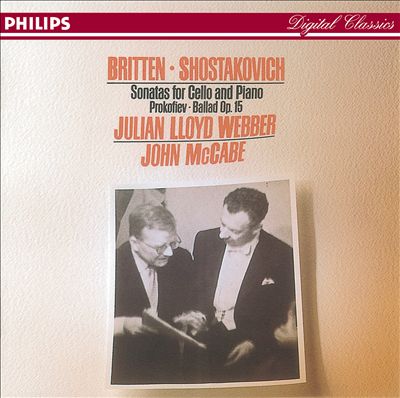Britten: Cello Works
View record and artist detailsRecord and Artist Details
Composer or Director: Mstislav Rostropovich, Benjamin Britten
Genre:
Chamber
Label: London
Magazine Review Date: 10/1989
Media Format: CD or Download
Media Runtime: 68
Mastering:
ADD
Catalogue Number: 421 859-2LM

Tracks:
| Composition | Artist Credit |
|---|---|
| Suite No. 1 |
Benjamin Britten, Composer
Benjamin Britten, Composer Mstislav Rostropovich, Composer |
| Suite No. 2 |
Benjamin Britten, Composer
Benjamin Britten, Composer Mstislav Rostropovich, Composer |
| Sonata for Cello and Piano |
Benjamin Britten, Composer
Benjamin Britten, Piano Benjamin Britten, Composer Mstislav Rostropovich, Composer |
Composer or Director: Dmitri Shostakovich, Benjamin Britten, Sergey Prokofiev
Genre:
Chamber
Label: Philips
Magazine Review Date: 10/1989
Media Format: CD or Download
Media Runtime: 57
Mastering:
DDD
Catalogue Number: 422 345-2PH

Tracks:
| Composition | Artist Credit |
|---|---|
| Sonata for Cello and Piano |
Benjamin Britten, Composer
Benjamin Britten, Composer John McCabe, Piano Julian Lloyd Webber, Cello |
| Ballade |
Sergey Prokofiev, Composer
John McCabe, Piano Julian Lloyd Webber, Cello Sergey Prokofiev, Composer |
Author: Stephen Johnson
Even so, when the Shostakovich first appeared it was the apparent classicism—especially in the first two movements—that struck Soviet commentators most, and the new Philips version by Julian Lloyd Webber and John McCabe brings out that quality very convincingly. It isn't just the clarity of articulation and discreet use of rubato: there's also a fine grasp of overall shape: Lloyd Webber's refusal to dawdle in the first movement's second theme means that the conventional exposition repeat sounds far less anachronistic than in Yo-Yo Ma's otherwise excellent performance on CBS—and yet there's no lack of tenderness either.
When it comes to range of expression and tonecolour Lloyd Webber acquits himself well, and the clear and atmospheric recording serves him admirably. Compare his veiled, almost repressed pianissimo in Shostakovich's first movement coda with the angry, cutting forte that opens the scherzo and the slithering glissando harmonics in the trio. From time to time however I did find myself wishing that he'd sustain tone a little longer through phrases, or even held notes: Lloyd Webber's tonal reticence in the opening of the Shostakovich means that the initial theme never quite takes off—at least the first time. Even the relatively undemonstrative Alexander Baillie (Unicorn-Kanchana) achieves more of a lilt here. And in the slow movement and finale I feel the laurels must go to Ma and Emmanuel Ax: Ma's gradual transition from withdrawn, agonized pianissimo to a richly expressive fff in the Largo lingers obstinately in the memory, as does the demonic brilliance of the Ma/Ax finale. Hearing McCabe in the trivial little tune that opens the finale it's difficult to put aside memories of his Haydn, so light and carefee does it sound in comparison, and although there's some spirited playing later on, the comic-melodramatic outburst of bar 181 has rather less bite a pity, for in the earlier movements this new version really is strongly competitive.
In the Britten, Lloyd Webber and McCabe are, I feel, more consistently successful—and it certainly isn't a case of the new version paling beside the classic Rostropovich/Britten. Lloyd Webber and McCabe's subdued humour in the
So Rostropovich remains the real heavyweight in the Britten Sonata, and equally in the two suites—don't forget, all three pieces were written for him—and the transfer to CD is remarkably successful: it's difficult to believe the recording of the Sonata is 28 years old and that of the suites nearly 19 years. There is, however, a presentation problem: the movements of the suites aren't listed anywhere—neither in the booklet, on the back of the box or on the disc itself, and we aren't even told how many tracks are allotted to each piece. For the benefit of newcomers to this music, the First Suite has nine tracks, the Second five (one per movement in each case).'
Discover the world's largest classical music catalogue with Presto Music.

Gramophone Digital Club
- Digital Edition
- Digital Archive
- Reviews Database
- Full website access
From £8.75 / month
Subscribe
Gramophone Full Club
- Print Edition
- Digital Edition
- Digital Archive
- Reviews Database
- Full website access
From £11.00 / month
Subscribe
If you are a library, university or other organisation that would be interested in an institutional subscription to Gramophone please click here for further information.




